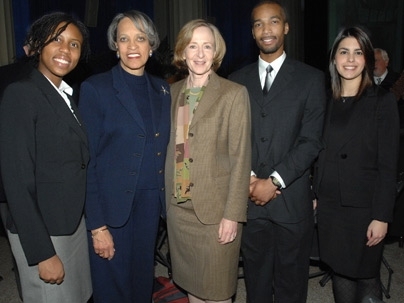In an emphatic keynote address at MIT's 35th Annual Dr. Martin Luther King, Jr. Breakfast Celebration on Feb. 5, educator and humanitarian Johnnetta Cole urged all members of the MIT community to take responsibility for achieving a diverse and inclusive campus.
"It's in your hands," Cole, the first African-American woman to serve as president of Spelman College, told a packed Morss Hall.
Cole and other speakers at the breakfast, titled "Yes, We Must: Achieve diversity through leadership," cited President Barack Obama's election as a major step toward fulfilling King's dream. After Obama's election, "Many of us would greet each other and we would say, 'I never thought it would happen…'" and here Cole interrupted herself to ask the audience, "What's the rest of it?"
"In our lifetime," the audience responded in unison.
"Oh, but my brothers and my sisters, it has happened!" Cole exclaimed.
The 2008 election proved that race is no long a barrier to the highest office in America, she said, but did not mean racism had ceased to exist. Indeed, racial incidents following Obama's election underscore the persistence of bigotry across color, class and race lines, she said.
"Bigotry is not just human nature. It's learned. And if it is learned, guess what? It can be unlearned," she said, before challenging her audience to take a long, hard look at themselves.
"Learn how you learned your prejudices," she said.
Cole and others cautioned that much more work lay ahead for the nation. As one speaker put it, "The theme for this celebration is 'Yes, We Must.' But what must we do?"
Cole called for expanding King's dream of inclusion to encompass gender, sexual orientation, age, class and mental and physical disabilities. "I believe that if Dr. King had lived beyond the 38 years that he gave to us that he would have described and worked for an even larger dream," Cole said.
In her remarks, MIT President Susan Hockfield underscored the Institute's ongoing commitment to achieving King's dream of a diverse and inclusive community.
"This time, we are asking everyone to help shift the great stone of change. It's another lesson we can learn from the election of President Obama: when many, many people feel empowered, and seize opportunities for progress, together they can create unprecedented change," Hockfield said.
"Let me be clear: A culture of inclusion is not something we want to pursue because it is a warm, fuzzy, feel-good idea," she said. "We must create a culture of inclusion, so that we can actively capitalize on our diverse skills and perspectives, so that we can better advance the fundamental mission of MIT."
Nor can tight budgets be "an excuse for inertia and inaction," she said. While reassuring the audience that "budget pressures will not deflect us from this work," Hockfield also pointed out that some important steps do not require funding.
"It costs nothing to ask, in an annual review, what steps an individual has taken to build a culture of inclusion -- or to educate your colleagues about the difference between a 'search' and a 'sort,' " she said, referring to efforts to actively search for qualified minority and female faculty and not to simply sort through already familiar candidates.
The breakfast also featured remarks by two students, who each received standing ovations for their frank descriptions of the role race played in their lives.
Joy Johnson, a graduate student in electrical engineering and computer science, stressed that inclusion does not stop at the campus edge.
"It requires we have interaction with one another, not only in the lab, in the classroom, and in the corridors, infinite or otherwise," she said. "We must give credit where credit is due, not only in our academic work but in our everyday lives. And this must begin with acknowledgment -- of our janitors, our lab technicians or bus drivers as easily as we speak to our Institute professors."
Matthew L. Gethers, a biological engineering senior recently named a Rhodes Scholar, warned that despite Obama's election, stereotypes still circulate. "Most importantly and most dangerously, stereotyping can cause us to doubt ourselves," said Gethers, who has taught engineering in Boston's public schools.
For the students he worked with, Gethers said, stereotyping is a far greater tragedy than low test scores. "These students honestly don't believe they can grow up to become astronauts or physicists or mathematicians or even president."
Yet the overall spirit of the breakfast was upbeat, as speakers reflected on change that they had not dreamed they would live to see. "The first family of America, a black family, moved into the White House -- the very White House that slaves helped to build," Cole noted in ringing tones.
A version of this article appeared in MIT Tech Talk on February 11, 2009 (download PDF).






